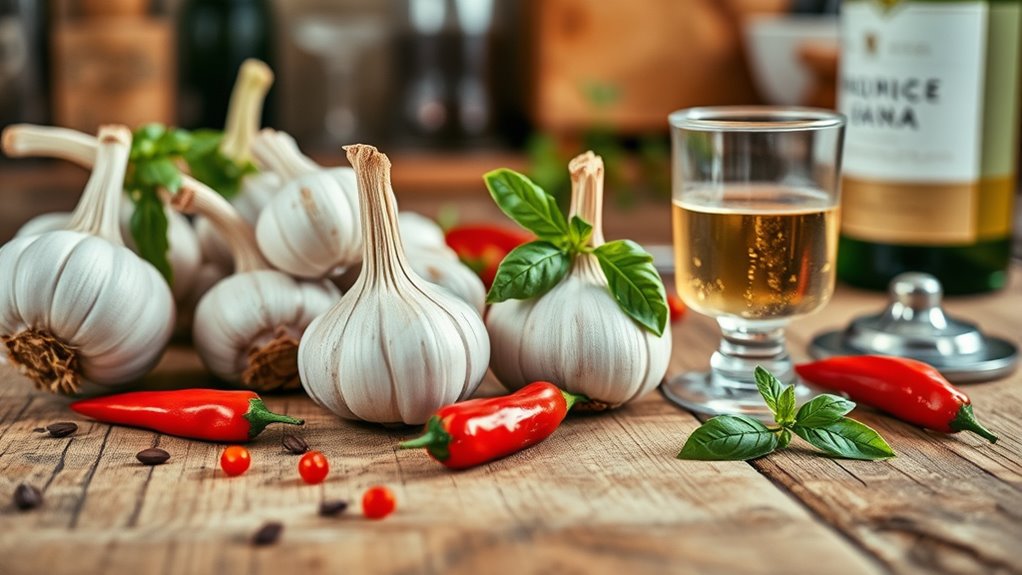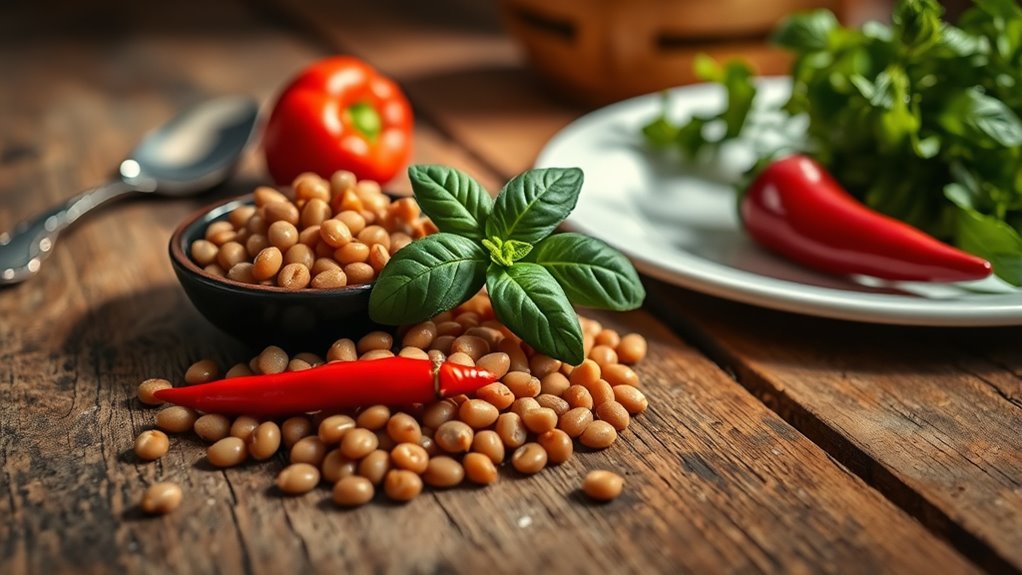Italian culinary superstitions reflect deep cultural beliefs that influence your food choices and rituals during celebrations. You might avoid poultry at New Year or serve lentils to attract prosperity. Sharing a meal with loved ones and clinking glasses are seen as ways to ward off evil spirits and bring luck. These traditions connect past customs with modern life, helping you embrace your cultural heritage. If you continue exploring, you’ll discover even more fascinating insights into Italian food customs.
Key Takeaways
- Food superstitions in Italy often symbolize luck, prosperity, and protection, influencing traditional holiday and everyday meals.
- Rituals like toasting or sharing bread are believed to ward off evil spirits and strengthen social bonds.
- Specific foods, such as lentils and grapes, carry symbolic meanings related to wealth and abundance.
- Regional variations reflect local customs, showing how superstitions adapt across Italy’s diverse cultural landscape.
- These beliefs remain relevant today, reinforcing cultural identity and hope during holidays and special occasions.

Italian culinary superstitions reveal how deeply food traditions are woven into the culture, often carrying symbolic meanings and beliefs about luck and protection. These superstitions are rooted in centuries of tradition, where every dish, ingredient, or ritual is believed to influence one’s fate. You might not realize it, but when you prepare or enjoy a meal in Italy, you’re participating in a centuries-old web of beliefs shaped by food origins and traditional rituals. For example, many superstitions center around specific foods and their origins, as people have long thought that certain ingredients can bring good luck or ward off evil. In Italy, it’s common to avoid serving chicken or poultry at New Year’s celebrations because of a superstition that these foods might bring bad luck. Instead, people often opt for lentils, which symbolize prosperity, or grapes, which are believed to bring abundance. These choices are not random; they stem from food origins that are deeply embedded in Italian history and folklore.
Traditional rituals also play a significant role in how these superstitions are practiced today. For instance, during festive meals, it’s customary to start with a toast that involves clinking glasses, as it’s believed to ward off evil spirits and ensure good fortune. Similarly, the act of breaking bread or sharing a meal is seen as a way to foster unity and protect against misfortune. You might notice that some families keep specific items, like a sprig of basil or a coin in the dish, as symbols to attract luck or safeguard the household. These rituals often connect to regional beliefs, with variations depending on local customs, but they all emphasize the importance of food as more than sustenance — it’s a vessel for cultural protection and prosperity.
Even today, these superstitions remain relevant, especially during holidays or special occasions. Many Italians follow these traditions not just out of habit but because they believe in their power to influence the future. Whether it’s choosing specific foods or performing particular rituals, these practices serve as a bridge linking the past to the present. They remind you that food is not merely about nourishment but also about cultural identity, continuity, and hope. So, next time you sit down for an Italian meal, remember that every bite might be steeped in centuries of belief, connecting you to a rich tapestry of food origins and traditional rituals that continue to shape the way Italians celebrate and protect their good fortune.
Frequently Asked Questions
Are Italian Culinary Superstitions Still Widely Followed Today?
Yes, you’ll find that Italian culinary superstitions are still quite common today. You probably follow some food symbolism or superstitious rituals without even realizing it, like avoiding certain foods on specific days or using lucky charms during meals. These traditions remain a meaningful part of Italian culture, blending history and modern life, and many people believe they bring good luck or ward off bad luck during family gatherings and festive occasions.
How Do These Superstitions Vary Across Different Italian Regions?
You’ll find that regional variations shape how Italians follow culinary superstitions, with southern areas often emphasizing luck with specific foods like lentils or grapes, while northern regions focus on avoiding certain behaviors before meals. Cultural influences, such as local traditions and historical backgrounds, deeply impact these practices. Though some superstitions are less strict today, understanding these differences helps you appreciate Italy’s diverse culinary customs and their ongoing cultural significance.
Do Italian Superstitions Influence Modern Restaurant Practices?
Yes, Italian superstitions influence modern restaurant practices. You might notice superstition-driven menu choices, like avoiding certain dishes on specific days or seasons. Superstitions also influence ingredient selection, such as omitting particular herbs or foods believed to bring bad luck. Chefs often incorporate these beliefs subtly, respecting tradition while appealing to customers who value cultural authenticity. This blend of superstition and cuisine keeps Italy’s culinary heritage vibrant today.
Are There Specific Superstitions Related to Italian Holiday Foods?
During Italian holidays, you might avoid serving lentils, as some believe they bring wealth and good luck, making them a key part of superstitious rituals. For example, a family may prepare a special dish of lentils on New Year’s Eve to attract prosperity. These superstitions related to holiday foods influence traditions, encouraging the inclusion of specific dishes to bring positive energy and good fortune for the year ahead.
How Do Italian Superstitions Compare to Those in Other Mediterranean Cultures?
You’ll find Italian superstitions share similarities with other Mediterranean cross-cultural beliefs, like avoiding certain foods or rituals to bring good luck. While regional culinary customs differ, many Mediterranean cultures emphasize symbols, like bread or fish, for prosperity. Compared to others, Italians often focus on specific food-related superstitions tied to holidays, but all these traditions aim to guarantee positive outcomes through shared food practices across the Mediterranean.
Conclusion
As you embrace Italian culinary superstitions, remember they’re more than old tales—they’re symbols of hope, love, and tradition woven into every dish. Each superstition is like a gentle thread, connecting past and present, guiding your hands and heart in the kitchen. By honoring these beliefs, you invite warmth and prosperity into your life, turning simple ingredients into stories of luck and legacy. In these rituals, find a rhythm that sweetens every bite with meaning and magic.









